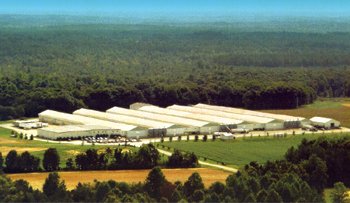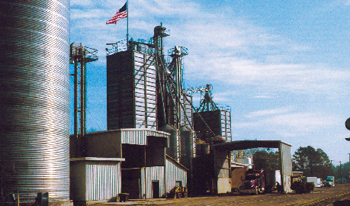
North Carolina’s Braswell Foods
has been pro-active on the environmental front, with its egg production
facilities recently being ISO certified, and the company is actively
involved with research on how to get more—in terms of nutrient
management—from poultry litter.
North Carolina’s Braswell Foods has been pro-active on the environmental front, with its egg production facilities recently being ISO certified, and the company is actively involved with research on how to get more—in terms of nutrient management—from poultry litter.
To say that things have been busy lately at North Carolina’s Braswell Foods would be an understatement. In addition to running one of the largest contract egg and pullet production companies in the state, earlier this year the company wrapped up the demanding process of having its subsidiaries—which include three egg production operations—ISO 14001 certified.
 Braswell Eggs has its own egg production facilities, through associated companies, and manages the production contracts of about 50 independent egg production growers. All of the operations have written agreements with the farms they deal with that application of manure will be done in a responsible manner. Braswell Eggs has its own egg production facilities, through associated companies, and manages the production contracts of about 50 independent egg production growers. All of the operations have written agreements with the farms they deal with that application of manure will be done in a responsible manner. |
And on the manure management side, the company is actively involved with research being done at North Carolina State on how to get more—in terms of nutrient management—from poultry litter.
The thrust for all of this activity comes directly from the top, from the company’s president and CEO, Scott Braswell, the third generation of the family to head up the company. “We started talking some time ago about what we needed to do to be the best in terms of quality control and environmental management,” says Braswell. After reviewing the environmental programs available, ISO 14001certification seemed to fit best on both of those fronts, he says.
The ag industry, notably on the livestock side, has been under a great deal of scrutiny in North Carolina, mostly due to the problems the industry ran into on the hog side in the mid-1990s. But North Carolina also has a good-sized egg and poultry industry, and the companies involved have taken their own steps to illustrate that they are responsible on the environmental front.
 Company president Scott Braswell (right, in photo) and Robert Pike, general manager of Braswell Foods. “Scott has agreed to invest the money that was necessary to get the very best we can get in terms of certification, and to work to be industry leaders,” says Pike. Company president Scott Braswell (right, in photo) and Robert Pike, general manager of Braswell Foods. “Scott has agreed to invest the money that was necessary to get the very best we can get in terms of certification, and to work to be industry leaders,” says Pike. |
“We’ve worked hard to be very pro-active,” says Robert Pike, general manager of Braswell Foods. Being pro-active is not really anything new for the company, which takes pride in its environmental performance both in its modern high rise facilities and its more traditional poultry facilities. “We’ve had lagoons on some of our operations for over 30 years, without any problems,” notes Pike. The company has taken the right steps, making sure that its lagoons were built on proper sites, with good soil compaction.
That concern about the environment carries over to present day operations, and was part of the reason for the recent ISO certification. “Scott has agreed to invest the money that was necessary to get the very best we can get in terms of certification, and to work to be industry leaders,” says Pike. The ISO certification positions them well in that regard.
The International Standards Organization, or ISO, has been developing voluntary technical standards for many sectors of business, industry and technology since 1947. Many of ISO’s standards cover traditional manufacturing processes—its standards are quite widely used in automobile manufacturing, for example. But the organization has also developed voluntary standards relating to the quality and environmental performance of products.
The ISO 14001 standard was set up to offer assurances that an operation has taken the environmental impacts of its activities into consideration, has a plan for mitigating environmental harm, is keeping track of its performance and is dedicated to improvement. And just as ISO certification has become very commonplace in some manufacturing industries, certification could become increasingly common in agriculture.
Although many of the measures to meet ISO 14001 were already in place at Braswell, the company still had to undergo a rigorous audit from an outside third party, NSF International Strategic Registrations Ltd.
Based in Ann Arbor, Michigan, NSF-ISR is a wholly-owned subsidiary of NSF International, an independent, not-for-profit organization, said to be a leading global provider of public health and safety risk management solutions. As a member of an ISO subcommittee, NSF-ISR actually helped develop the ISO 14001 standards.
 Braswell Foods Environmental Policy Braswell Foods Environmental Policy
Principles of Conduct: Environmental Management Systems (EMS): Compliance: Quality Practices: Sustainable Manure Management Practices: Preventative Maintenance: Continual Improvement: Communications: |
“ISO 14001 represents a commitment in terms of time and resources on our part, but it goes beyond that—it’s a further commitment we’re making to be above and beyond in respect to regulations,” says Pike.
The audits proceed on the basis that operations are abiding by all state and federal regulations, including in the area of manure management. In fact, Pike says, the state and federal regulatory requirements covered off a lot of what they needed to do in terms of manure management for ISO 14001. “From there, a lot of it is focused on the record keeping that you are doing,” he explains.
“They want to know what you are doing on the ground in terms of manure management, but also what you are doing regarding keeping records of what happens on the fields.” This includes everything from keeping track of the times and acreages where manure is applied, to monitoring soil and ground water samples, and calibrating the spray guns used for applying lagoon water.
All of this is reviewed and documented by the ISO auditors. “Not only do you have to be doing all the right things with manure management, you have to be able to document that you are doing it,” says Pike.
The audit process involves interviewing people, top to bottom. “We wanted—and needed—to get commitment from every employee,” says Pike. “You don’t know who the auditors are going to talk to. They might want to talk to the guy who drives the manure truck to find out when it was last calibrated. They talked to our shop mechanic for 30 minutes, asking him how we handled spent oil. It sure keeps you on your toes.”
Braswell was already a leader on the environmental side in that it had an Environmental Management System (EMS) in place (see the company’s Environmental Policy on page 12). Initiated in 2001, this was useful in achieving certification, says Pike. It’s not mandatory for farms to have an EMS system in North Carolina—Braswell opted to set it up through choice. But having an EMS system is certainly viewed positively by government regulatory agencies. In addition, all of the farms are also QAI certified.
Braswell Eggs manages the production contracts of about 50 independent started pullet and egg production growers. Associated company Glenwood Foods, LLC is a company-owned egg production, processing and marketing operation, with six, 100,000-bird, inline production facilities, and is located in Virginia. Carolina Egg Co Inc/Red Hill Eggs, LLC is a company-owned, 650,000-bird, egg production processing and marketing operation near Red Oak, North Carolina. The above companies, along with Braswell Milling, which manufactures feed for Braswell Foods, as well as outside companies, are all under the larger corporate umbrella of Braswell Foods.
The independent contract growers that Braswell Eggs deals with have made their own arrangements for litter clean-out and land application. Glenwood has agreements with neighboring farmers to utilize the manure from its high rise houses. Carolina Egg/Red Hill has a flush-to-lagoon system for its older houses and arrangements with farmers to utilize the manure from the high rise houses. All of the companies have written agreements with the farms they deal with that application of manure will be done in a responsible manner.
Manure from the high rise houses is land applied at carefully calculated agronomic rates using an 18-foot spinner spreader from Chandler Equipment of Gainesville, Georgia. The lagoon effluent is applied to company-owned land utilizing a Cadman drag hose reel system.
It hasn’t been a problem finding a home for the manure on local pasture and crop lands, the latter being in cotton, corn or soybean. Since Braswell is also in the organic egg business, they have been encouraging some producers to switch to organic corn. “We’ve been giving some of our manure away to help them get through that organic transitional period of three years without commercial fertilizers,” says Pike.
Pike believes one of the key features of a successful manure management program starts not in the field, but in the office: having a commitment to being environmentally responsible from top management.
“In the case of a privately owned company like Braswell, management has set the tone for the company and completely supports the investment we’ve made in manure management.” That ranges from the investments in modern lagoon pumping systems, to the Compost Cats operating in the houses and the field spreading equipment.
And while it may have been said before, sometimes it really does come down to having good people, whether they are in the office keeping up-to-date records or out in the field doing field samples, says Pike. “You can have all the manure management programs you like, but you need to have good people carrying out things like calibration and equipment maintenance, and maintaining the records. In addition, they need to be independent thinkers, so they can make good judgments.”
That good judgment and forward thinking needs to be exercised at a senior level in planning ahead with facilities, he says. There has been ongoing concern in the region about run-off of rain water from poultry houses. So when Braswell built a new facility at Red Hills, North Carolina, it included a sediment basin to handle any groundwater or spills. “The whole complex was set up and graded so all the water would flow to that sediment pond.”
This kind of forward thinking comes from an area that has seen three major hurricanes in the last decade. “We’re kind of in a hurricane alley, maybe not as much as Florida or Louisiana, but we were getting hurricanes seven or eight years ago that these other states were not getting.
“It caused problems for people in the hog industry in North Carolina, but we need to worry about it, too. With Hurricane Floyd, we had to deal with 30 inches of rain in four days.” Pike described the flooding in the area from Hurricane Floyd in 1999 as “terrible.”
“A lot of farms had problems, but fortunately we built our facilities in the right places to start with. We survived without any discharges.”
The new high rise facilities are also planned to facilitate manure management processing; having sufficient space in the pits, for example, for Compost Cats or skid steer machines to maneuver.
Pike adds that sometimes a successful manure management program comes down to some good old fashioned community relations. “First and foremost, we want to be good neighbors in the community.”
That goes for Braswell Eggs, as well as the larger Braswell Foods Group. From modest beginnings, the company has now grown into the Mid-Atlantic region’s largest vertically integrated commercial egg operation. The company’s Braswell Milling has a capacity of 200,000 tons per year and serves two million commercial layers (1.5 million are affiliated with the company) and 75,000 hogs. Braswell Milling is the largest organic feed manufacturer in the United States.
 The Braswell Foods Group includes milling operations under Braswell Milling, which is the largest organic feed manufacturer in the United States. Since the company—through Braswell Eggs—is also involved in the organic egg business, it has been encouraging some of the crop producers they deal with to switch to organic corn. It has been giving away manure to some of the producers to help them get through the organic transition period of three years without commercial fertilizers. The Braswell Foods Group includes milling operations under Braswell Milling, which is the largest organic feed manufacturer in the United States. Since the company—through Braswell Eggs—is also involved in the organic egg business, it has been encouraging some of the crop producers they deal with to switch to organic corn. It has been giving away manure to some of the producers to help them get through the organic transition period of three years without commercial fertilizers. |
While the company’s certification makes sense in terms of being a good corporate citizen, it also makes a lot of sense in terms of marketing, both with their egg customers, such as Wal-Mart and Food Lion, and with regulatory bodies. “I think what we might see is things like ISO 14001 and EMS helping the regulatory bodies do their work,” says Pike. “Companies that have these programs in place could be ahead of the game.”
On a broader front, Pike says that the egg industry as a whole has generally been pro-active on the environmental front, noting its high participation rate in the EPA air compliance consent agreement. The United Egg Producers, and its Environmental Committee (of which Pike is chairman), have been instrumental in achieving those numbers. “The egg industry is behind doing what’s right in terms of the environment,” he says.
While Braswell has made a lot of good environmental decisions in the past, ISO 14001 makes efforts to ensure that continues. As part of the certification process, companies must commit to making further environmental improvements. In that respect, Braswell is working with North Carolina State, and some of its contract layers, on further research into composting its manure.
While there is fairly good recognition of manure as a nutrient, Pike thinks there’s still a ways to go, and further opportunities. “It’s like all the other things you are producing, whether it is eggs, chickens or beef, you need to look at everything that is going into your system and the possibilities for creating margins. I firmly believe that one day, manure sales will approach, from a profitability standpoint, what egg producers are getting off their eggs.” He notes that several Midwest producers are already pelletizing their manure and selling it at the retail level.
“Things are headed in that direction,” he says.